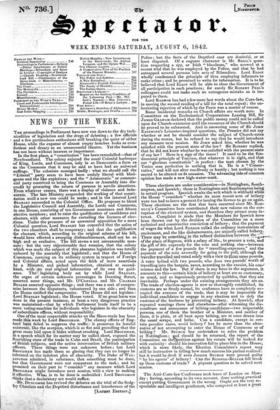Three elections are under consideration—in Nottingham, South- ampton, and Ipswich ;
those in Nottingham and Southampton being in actual progress. Ipswich awaits the writ which is withheld while the House " considers" whether its most recent acts of bribery were too bad to leave a pretext for issuing the licence to go on again. These elections are the first that have occurred since Mr. Roe- DUCH'S Committee have contributed their new volume on the cor- ruption of the electoral system and therefore they attract some in- terest. Complaint is made that the Members for Ipswich have been thrown out by the decision of the Committee on a mere technical and constructive conviction of bribery; that the payment of wages for what Lord SANDON called the ordinary instruments of excitement, and the like disbursements, are unjustly called bribery.: in the refiPc4 4iFAiklocioll between There may be something of the place of flagman, with a salary of 308., to procure a vote, and the gift of 308. expressly for the vote and nothing else—between the payment of a few pounds for " travelling-expenses " and the payment of the coin avowedly for going to the poll, although the traveller travelled and voted solely with a MiT 19 those same pounds. A voter bribed with two pounds, who does two pounds' worth of travelling into the bargain, saves, according to the casuist, his con,' science and the law. But if there is any force in the argument, it amounts to this—certain kinds of bribery at least are so customary, so usual, and so ingeniously protected by quibbles, that they are inevitable. Perhaps under the existing arrangements they are so. The trade of election-agents is now so thoroughly established, its customs are so firmly rooted, its craftsmen have so completely oc- cupied the avenues of the trade, that it may be impossible for individual candidates to engage in any election and to defy the customs of the business by preventing bribery. At Ipswich, after repeated warnings there and elsewher&—after witnessing the dis- comfiture and annoyance of bribing-candidates—two respectable persons, one of them the brother of a Minister, and neither of them, it is plain, at all bent upon bribing, are at once drawn into the usual scrape, and bribe. Can a candidate, except in cer- tain peculiar cases, avoid bribery? has he more than the alter- native of not attempting to enter the House of Commons or of bribing? Mr. STURGE has undertaken to solve the problem at Nottingham; ud should be be returned, the report of the
Committee on th etition against his return will be looked for with curiosity: sho Id his innovation fail to place him in the House, which is more likely, the Election Committee's report may
still be instructive in telling how much success his purism realized: but it would be droll if even JOSEPH STURGE were proved guilty "by his agents" of bribery! Can the RUSSELL-DULLER bill break up these customs of trade? A piquant question to be solved next. session.


























